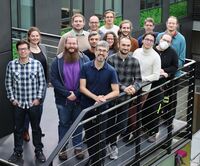International Center for Computational Logic
Aus International Center for Computational Logic
International Center for Computational Logic
The International Center for Computational Logic (ICCL) is an interdisciplinary center of competence in research and teaching in the field of Computational Logic, with special emphasis on Algebra, Knowledge Representation, Logic, and Formal Methods in Computer Science. It has been founded at TU Dresden in October 2003. The following research groups are associated with ICCL:
- Algebra and Discrete Structures
- Algebraic and Logical Foundations of Computer Science
- Automata Theory
- Computational Logic
- Knowledge-aware Artificial Intelligence
- Logic Programming and Argumentation
- Knowledge-Based Systems
Members and Guests
Newest Publications
Nils Küchenmeister, Alex Ivliev, Markus Krötzsch
Towards Mass Spectrum Analysis with ASP
Theory and Practice of Logic Programming, February 2026
Details Download
Alex Ivliev, Markus Krötzsch, Maximilian Marx
SPARQLing Datalog for Rule-Based Reasoning over Large Knowledge Graphs
In Maribel Acosta, Marieke van Erp, Sebastian Rudolph, Olaf Hartig, Blerina Spahiu, Anisa Rula, Daniel Garijo, Francesco Osborne, eds., Proceedings of the 23rd European Semantic Web Conference (ESWC 2026), LNCS, to appear. Springer
Details
Raimund Dachselt, Lukas Gerlach, Philipp Hanisch, Alex Ivliev, Markus Krötzsch, Maximilian Marx, Julián Méndez
Declarative Debugging for Datalog with Aggregation
In Alexander Krause, João Felipe Pimentel, eds., Proceedings of the Workshops of the EDBT/ICDT 2026 Joint Conference (EDBT/ICDT-WS 2026), Tampere, Finland, March 24, 2026, CEUR Workshop Proceedings, to appear. CEUR-WS.org
Details Download
Manuel Bodirsky, Simon Knäuer, Sebastian Rudolph
Datalog-Expressibility for Monadic and Guarded Second-Order Logic
ACM Transactions on Computational Logic, 27(2):1-42, 2026
Details Download
NEWS
January 13, 2026Tim Lyon has joined the editorial board of the Bulletin of the Section of Logic
November 27, 2025Best demo award for GPTKB at ISWC
October 23, 2025Dörthe Arndt wins Rule Challenge Best Paper Award at RuleML+RR 2025
September 30, 2025Filippo De Bortoli wins Best Student Paper Award at FroCoS 2025
January 20, 2025ICCL Researchers Contribute to Lean Standard Library
… weitere Ergebnisse


























































